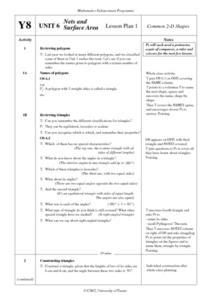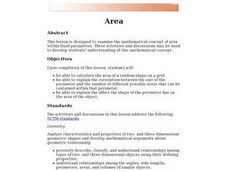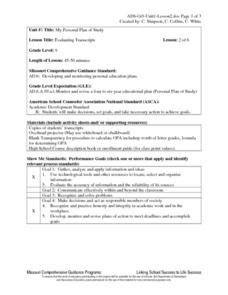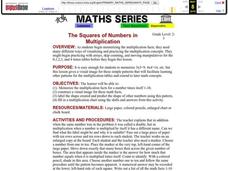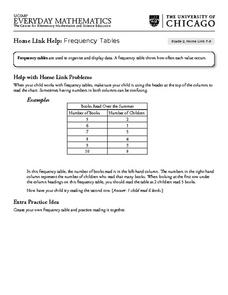Curated OER
Origami Ducks: Geometry, Listening, and Following Directions
Make origami ducks with your class to reinforce geometry concepts and vocabulary; develop fine motor and visual translation skills; and enrich study of Japanese culture, the pond habitat, or migration. Create a whole group "worksheet"...
Curated OER
Nets And Surface Area
Upper graders investigate how to find the surface area when using two-dimensional shapes. They conduct an investigation in groups while working sample problems given during class discussion with the teacher. They also review how to...
Curated OER
Place Value
Providing a short review of place value, this activity focusing on numbers in the hundreds, could be used in a lower elementary classroom. This eight question worksheet could be a quick and easy way to have students practice this skill.
University of Wisconsin
Fraction Rules
Both a reference sheet and skills practice worksheet, this handout on common fraction rules reviews steps for adding, subtracting, multiplying, and dividing fractions. Twenty examples are provided to demonstrate these skills, and...
Curated OER
Area Applet
Elementary math classes calculate the area of a shape and explain the correlation between the size of the perimeter and the areas that can be contained within that perimeter. They also explain the effect the shape of the perimeter has on...
Curated OER
Tick Around the Clock
Learners examine and discuss the differences between clocks they are shown. Using the internet, they research how people used to tell time before clocks. They review what the long and short hand on the clock represent and practice...
Curated OER
Pet Care Pluses
The humane society has created a foundational math symbols lesson. The class defines the words plus, minus and equals, then solves math equations based on proper pet care.
Curated OER
Lining Up the Cars
Students review how to count the total amount of arrangements using multiplication. Using a computer, they determine the amount of cars needed for a parade in their local community to move the town's officials. They identify any patterns...
Curated OER
Frieze Patterns And Tiles
Learners investigate geometry with the use of a creative project. They review relevant vocabulary that includes turn, flip, side, and angles. Students also practice conducting transformations used as inspiration for the project. Then...
Curated OER
Mean, Median, Mode, Range
Learners engage in a study of mean, median, mode, and range in order to represent data in tables. They are also exposed to the results of data that is skewed because of the outlier.
Curated OER
Multiplying by 10, by 100, and by 1,000
Fourth graders write tenths and hundredths in decimal and fraction notations. In this math instructional activity, learners know the fraction and decimal equivalents for halves and fourths. Everyone answers numerous questions posed by...
Curated OER
Halves And Fourths
Young learners start out by going to the board to draw lines through shapes to identify halves. Then they are given a square of paper and are directed to fold the paper into halves and then into fourths. They color the halves and fourths...
Curated OER
Integration by Substitution
Looking for help in introducing integration by substitution to your calculus students? Here is a activity that walks a learner through a review of the change rule, and then by starting with more recognizable derivatives, it helps them...
Curated OER
Cylinders and Scale
Students review what a cylinder is and how a cylinder is measured. They build a variety of cylinders with different heights and radii. They compare the surface area and volume of each cylinder and discuss anything that surprises them...
Curated OER
Integers
Students explore integers through a review of basic knowledge and understanding of integers. They order integers on a number line and evaluate integer expressions with variables. Students order values from variable expressions on a...
Curated OER
Geometry, Pi, and Ancient Civilizations
By working together, pairs of students will complete a Pi webquest. Using the internet, they examine the ways people in the Ancient Civilizations of Egypt, Babylonia and Greece used Pi. To end the lesson, they review the concepts of...
Curated OER
Evaluating Transcripts
Ninth graders review their transcripts and calculate their individual grade point averages. They brainstorm on how they can keep track of their progress in school and what information will follow them throughout their lives. Each student...
Curated OER
Clock Fractions
Elementary schoolers generate and manipulate fractions. They review equivalent fractions and use an analog clock to create and add fractions. Pupils work in groups to complete two fraction worksheets.
Curated OER
Symmetry with Shapes
Students analyze a symmetrical stamp design with an equal balance of light and dark to create a pattern in succession. In this shape design lesson, students review concepts of sign, symbol and language across cultures. Students analyze...
Curated OER
How Much Is A Million
Help young learners visualize the concept of "a million." To convey concepts of numeration and literacy, they will listen to the book How Much is a Million? by David Schwartz. They should be able to make self-to-text connections....
Curated OER
The Squares of Numbers in Multiplication
Review multiplication facts and concepts! This clear, and easy to follow lesson will help your class to understand multiplication by using arrays and repeated addition. There are strategies to help with memorization and manipulative...
Curated OER
Numeracy
Students review numbers, number systems and the number operations through the use of online webpages.
Curated OER
Garden Variety Geometry
A home improvement plan can help adult learners preparation for the GED exam. They review vocabulary, prepare diagrams, complete a worksheet, calculate perimeters and analyze how to approach a story problem. They identify many geometry...
Curated OER
Frequency Tables - Home Link Support
For this home school support worksheet, 2nd graders, with a home support person, review the use of frequency tables to organize and display data. They make their own frequency table and read it with the support person.



